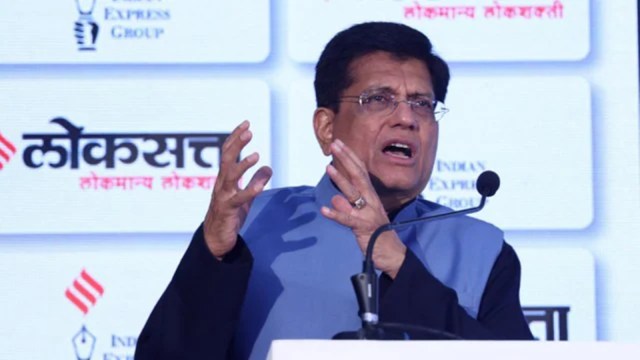TAKING AIM at the world’s biggest e-tailer Amazon, Union Commerce and Industry Minister Piyush Goyal Wednesday expressed concern over the surge in growth in e-commerce business, and said it could be the result of “predatory pricing”, and may lead to “social disruption” since it would adversely impact an estimated 100 million small retailers across the country.
“Are we going to cause huge social disruption with this massive growth of e-commerce? I don’t see it as a matter of pride that half of our market could possibly become part of the e-commerce network ten years from now,” said Goyal at the launch of a Pahle India Foundation’s report ‘Net Impact of E-Commerce on Employment and Consumer Welfare in India’. Pahle India is a not-for-profit chaired by Rajiv Kumar, former Vice Chairman of NITI Aayog.

Singling out Amazon and suggesting it was indulging in predatory pricing and selling products directly to consumers even though it isn’t allowed to, the Commerce and Industry Minister said, “Are predatory pricing policies good for the country? When Amazon says they are going to invest a billion dollars in India, we all celebrate. We forget the underlying story —that billion dollars is not being invested in any great service or in any significant way to support the Indian economy. They posted a billion-dollar loss in their balance sheet that year.”
Story continues below this ad
Goyal said e-commerce is growing at an annual rate of 27 per cent, meaning that e-commerce will double every three years. Much of this growth is in high-margin segments that small domestic retailers rely on for survival, he said. “If you make a Rs 6,000 crore loss in one year, doesn’t that smell like predatory pricing to any of you? What did that loss come on? They are, after all, an e-commerce platform, and they are not allowed to do B2C legally. The e-commerce platform, legally, cannot do business-to-consumer (B2C),” he said.
Predatory pricing is a practice, generally by a new player in the market, of keeping prices superficially low to undercut competition and gain market share.
“I’m not wishing away e-commerce. It’s here to stay,” the minister said, “but we have to think very carefully and cautiously about its role.”
The Pahle India report, in fact, said, online vendors have generated 15.8 million jobs in India, including 3.5 million for women, with about 1.76 million retail enterprises participating in e-commerce activity. The study is based on a pan-India survey of 2,062 online vendors, 2,031 offline vendors, and 8,209 consumers of products from e-commerce websites across 35 cities in 20 states and UTs.
Story continues below this ad
This is the second time in the last five years Goyal has publicly targeted Amazon. In 2020, when it announced a billion dollar investment in India, Goyal, who was the Commerce and Industry Minister then too, said the online retail major was not doing the country “a great favour.” At that time as well, he had said the financial losses reported by the e-commerce company raise questions about its business practices in India.
During his speech at the launch of the report, the minister highlighted the imbalance between small traders and large retailers like Apple. “How many mobile stores do you see now on the corner? And how many were there ten years ago? Where are those mobile stores? Will only Apple or large retailers sell mobile phones and their accessories?”
In the past, Goyal has spoken out against other major Indian conglomerates too. In 2021, he targeted Tata Sons — the holding company of the Tata group — for “opposing consumer protection regulations” for e-commerce. At that time, he said that the 153-year-old group was according “greater importance” to newly acquired businesses than to national interest.
“If any of you have ever studied a retail store, it may have 100 items on display, but it’s not as if all of them contribute equally to the survival of that store. There will actually be 70 items that are loss-making. It’s the 5-10 per cent of items that really generate profit,” Goyal said. Therefore, he said, e-commerce growth in high-margin items such as consumer goods is 26-28 per cent, while there is relatively lower growth in grocery items.
Story continues below this ad
In the race for market share, with e-commerce growing by 27 per cent per year, the 100 million small retailers across the country who also serve consumers should not face disruptions, Goyal said. He said the decline of traditional “mom and pop” stores in countries like the United States and Europe was due to the rise of e-commerce. He pointed out that Switzerland has a cautious approach to e-commerce.
Hours after Goyal’s speech, Chandni Chowk MP and Secretary General of the Confederation of All India Traders (CAIT), Praveen Khandelwal, “complimented Shri Piyush Goyal for underlining the methodology of foreign companies” to capture the Indian market created unhealthy and uneven competition and that this should be scrutinised. In a statement, Khandelwal said global companies like Amazon often invest heavily to establish a strong market presence by indulging in predatory pricing, loss funding, and owning inventory, which is a violation of the FDI policy of the Government.
Goyal’s comments come as the government has taken it upon itself to create an e-commerce protocol so that various stakeholders can participate in the supply chain. Called the Open Network for Digital Commerce (ONDC), it has been built to promote open networks for all aspects of the exchange of goods and services over digital or electronic networks. It is based on open-source methodology, using open specifications and open network protocols independent of any specific platform. However, major e-commerce players, including Amazon, Flipkart, Swiggy, and Zomato, are yet to fully integrate their marketplaces into the ONDC network.

































